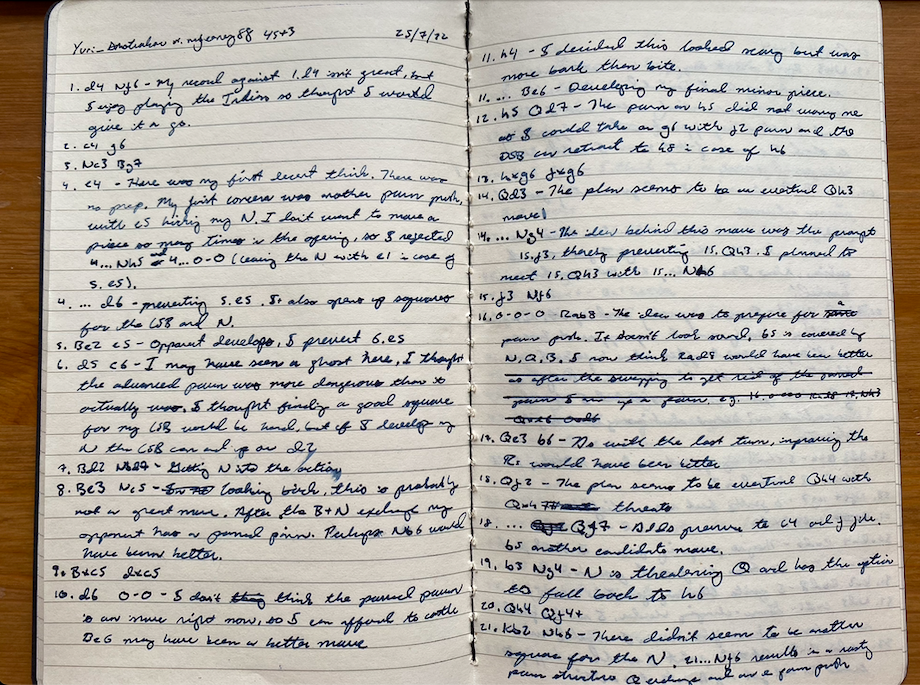
Analysis Paralysis
"Analyze your games": Easier said than doneEverywhere you look for chess improvement advice you'll find a version of the following: "Analyze your games". I am following that advice, and in this post I will share some of my analysis of this week's classical game and reflect on what I think the game taught me. I will also explain how my analysis of this game highlights why analysis is so difficult and often paralyses me in a way playing games does not.
This week's game was 45+3. I played black. The game is below.
Once the game was over I downloaded the PGN and began going over the game without any engine assistance. I picked up my notebook and pen and began writing down the moves and the occasional piece of commentary. I've posted some of the analysis below (apologies for the handwriting).

When analyzing this way I sometimes like to note what I was thinking at the time of the move, other possible moves, and what I was thinking during particular phases of the game. For example, I mention on turn 1 the following: "My record against 1.d4 isn't great, but I enjoy playing the Indian, so thought I would give it a go". On turn 10, I castled. In my analysis of that move I noted that my opponent's passed pawn was not very scary and that 10. ...Be6 may have been a better move.
This stage of analysis is a nightmare. I have no idea how much time to spend analyzing each move or what thoughts are worth recording. Should I be noting candidate moves on every move? Should I be creating a list of possible tactical and strategic ideas? Is it worth writing down how I'm feeling at each stage? The possibilities lead to a feeling of being paralyzed by analysis as the list of possible moves and variations grows. Each move seems to present an opportunity for analysis the length of a small novel, most of which could be dedicated to how blind I am to obvious moves and how bad I am at chess.
After going though the whole game without an engine I consult an engine. I then return to my analysis and use a different pen for post-engine notes. As you can see, this time I used a pink pen to record my post-engine thoughts.

What I find puzzling is that I spent relatively little time pondering what the engine showed. I think I fell into the trap of too often convincing myself that if the engine labeled a move as a mistake I knew it was one during the game or that when a move was just "fine" I did not need to analyze other candidate moves much at all.
My far from ideal post-engine analysis did reveal a number of facts that make me uncomfortable. For example:
- I did not consider 10. ... Bf8 or 12. ... Ne8
- I thought 21. ... Ne3 was possible but did not play it
- When my opponent played 32. Nd5 I was pretty sure it was a game-changing blunder, but it did not change the engine analysis as much as I expected.
- I moved far too quickly. The longest I spent considering one move was about 2.5 minutes and I spent fewer than ten seconds on the terrible 25. ...Nf7, which is not great for a game played with classical time control.
I suppose a few lessons from this game include: "You know pieces can move backwards, right?" and "Take your time". That these seem to be the main lessons from a classical game is a little disappointing. I was glad that the opening went pretty well considering I do not know any of the relevant theory. But I'm aware that surviving the opening is not a sufficient condition for a win.
I am now in the position of feeling as if I took the "analyze your games" advice but unsure about whether I am analyzing correctly. I have a few ideas about what to do differently for analysis of my next classical game:
- Write down how I feel about the game before analyzing any moves
- Dedicate myself to analyzing the state of the board every ten moves or so, answering questions such as: i) "What is the position telling me?" ii) "What pieces are weak/strong?" iii) "What is my strategic goal?"
- Note when I think a particular move resulted in a significant advantage/disadvantage.
- Consider candidate moves on turns that did not result in the evaluation bar dancing around
I will be sure to let you know how next week's analysis goes! If you have any analysis advice please pass it along.


